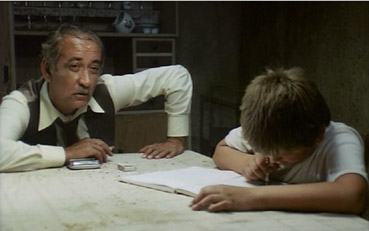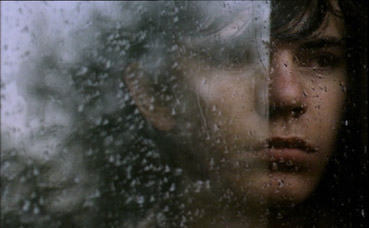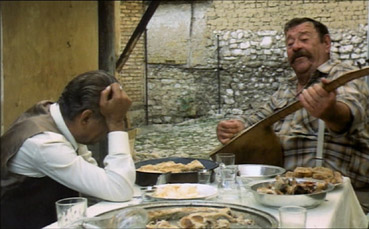|
"Will
the sun ever shine in this town as it should?" asks
Maho rhetorically of his son Dino, as his family scurries
indoors to escape a thunderstorm that has descended on their
garden party. "It won't, Dino," he concludes.
"Never." At this point it's uncertain if he is
talking about the weather or the Communist utopia that he dreams
his country will one day become. This is 1960s Sarajevo,
a time when Yugoslavia was following is own path of so-called
'soft Communism' independent of the Soviet Union. Moscow
had expelled the country from the World Communist league
for not toeing the official line, indirectly leading to
the formation of the Non-Aligned Movement in 1961, of which
Yugoslavia was a founding member. It's a time that precious
few filmmakers have recalled with anything other than hostility,
and one of the most disarming aspects of Do You
Remember Dolly Bell?, the debut feature of Sarajevo-born
director Emir Kusturika, is that it looks back not in anger,
but with a quietly affectionate nostalgia.
Maho is not the central character here, but was the one
I most immediately warmed to. His first appearance in the
film casts him in almost comical light. Arriving home late
and drunk, he immediately calls his three sons Kerim, Dino
and Midho to a family meeting, something that clearly happens
every night and which the boys had nipped off to bed in
the hope of avoiding. Here the three confess their sins
for the day and their father decides what action should
be taken, while youngest son Midho keeps minutes in a book
kept for the purpose. What at first plays like a parody
of an anarcho syndicalist approach to collective decision-making actually
starts to look like a good idea – the boys are encouraged
to be honest, to take responsibility for their actions and
discuss them, and the note-taking helps the youngest to develop his writing
skills.

The
real focus of the film, however, is middle
brother Dino, who is no longer the child that Midho will be for some years yet, nor the adult that Kerim is restless to become. Dino hangs out at
the local youth centre with his friend Marbles, with whom
he is studying hypnosis (Dino thinks it can improve the
world, Marbles wants to seduce the girls with it, Maho thinks
it's a waste of Dino's time) and whose tall tales of half-successful
sexual adventures he takes with a fist full of salt. The
centre is also visited by hard nut and small time crook
Pog, freshly escaped from jail and in the process of setting
himself up as a pimp. One night he wakes Dino and presents
him with a young, pretty, new-to-the-game prostitute and
orders him to keep her hidden for a few days, knowing Dino
has a den in the family pigeon loft. The girl has adopted
the name of Dolly Bell, also the name of an actress whose striptease
routine Dino had been so mesmerised by during a film show
at the youth centre a few days earlier. And Dino is at that
age when he is just beginning to notice that women are,
well, pretty damned interesting.
All
of which sounds (and to a degree is) familiar coming-of-age
stuff, and with a young, pretty prostitute in the loft of
a hormonal boy, it's not to hard to work out at least some
of what will happen next, but so much here is in the handling
and the detail. If you are coming to the film on a reverse
timeline from Kusturica's later, more energetically paced comedies
such as Underground or Black
Cat, White Cat, there's a good chance the gentle
pace and emotional depth of Do You Remember Dolly
Bell? will catch you completely off guard. It certainly
did me.
Inevitably,
Dino develops an affection for Dolly that blossoms into
a relationship, one that is doomed from the start both by her profession
and her association with Pog. Running in tandem is the changing nature of Dino's relationship with his father
Maho (beautifully played by Slobodan Aligrudic), who starts
to recognise that his son is making the transition from
boy to man and in whom he sees a future for his own political
dreams – in making his will, he proudly announces that Dino
will inherit his tobacco tin, his lighter, and "nine
books of pure Marxism." Mid-way through film, when
Maho first shows signs of a lung disorder that will soon
land him in hospital, the bond between the two has been
so convincingly developed that as Dino says goodbye to
his father at the hospital gates and watches him walk in
alone, I was surprised by the size of the lump in my throat.

If
the tone and pace differ markedly from later Kusturica,
we're on more familiar turf with the character and incidental
detail. There's also an autobiographical element that cannot help
but suggest the director's own first steps with music that
would later lead to his involvement with the No Smoking
Band, and the interrelationship between music and film that was to
become a Kusturica trademark. Although considerably less
boisterous than in the later films, the director's engagingly
oddball character humour is also in evidence: Marbles and Dino's attempts to hypnotise a bored
girl and a rabbit respectively; the short taxi ride that
intermittently hurtles its occupants against the windows;
Maho's brother's mournful and seemingly never-ending song
about Sarajevo; the entire family simultaneously mesmerised
by the water leaking through the ceiling. My favourite funny
moment is a little more abstract and occurs after Dino
has beaten the youth centre warden at chess. "Every
day in every way I am getting a little better," Dino
says, quoting his oft-repeated mantra, to which the warden
cheerfully replies, "Return my Secrets of the Occult."
Do
You Remember Dolly Bell? is a disarming delight,
a coming-of-age story in which even the familiar elements
are thoughtfully handled and given a fresh edge by the setting
and offbeat character detail. Kusturica paints a picture
of a community and a time that may be different from our
own (and may have a tint of rose about them), but in Dino's
bittersweet journey from boy to man, he connects us to the
characters through experiences are genuinely and touchingly
universal. Those who only know Kusturica for his later work
should definitely seek out this debut feature – apart from
its considerable stand-alone merits, it also shows a very
different side to one of modern cinema's most consistently
impressive and imaginative filmmakers.
Whether
this transfer has been licensed from elsewhere is uncertain – the picture quality is very watchable but varies
a little in quality and never really approaches pristine.
How much is down to the source print is uncertain, but decent
black levels in darker scenes appear to have achieved at
the expense of shadow detail – pop up the brightness and
you'll be watching compression artefacts. Daytime exteriors
are much better. The slight picture softness is likely a
print issue, and these days its hard to know if the toned
down colour palette was a deliberate artistic decision of
the result of faded source material. There are also dust spots here and
there, but they are never distracting. The framing is 1.66:1
and the picture is anamorphcally enhanced.

The
Dolby 2.0 mono soundtrack shows its age and budget, with
some slightly hissy trebles and an unspectacular dynamic
range. Otherwise there are no real problems here.
The
key extra here is an Interview with Emir Kusturica
(32:18), a compelling chat in which the director talks about
how important it is that your first film comes from a world that you
know, the disconnection of modern cinema from socio-political
issues, how Hollywood has lost its way, and the consumerist
nature of modern filmmaking. There's a nice moment when,
as some idiot's mobile goes off and after trying to talk
through the annoying ring tone, the director flashes a look
that nicely suggests just how much contempt he holds its
owner in.
The
Emir Kusturica Filmography is
no more or less than that suggests, and there are Trailers
for Black
Cat, White Cat (1:36), Underground
(1:05) and Life is a Miracle (1:41).
A
rather lovely first feature from Kusturica gets an OK but
not great transfer and only one extra of note, though it
is a goodie. The film itself is a must-see for Kusturica
fans, but also for anyone who appreciates a well told, involving
and very nicely detailed coming-of-age story. For the film
itself, recommended.
|